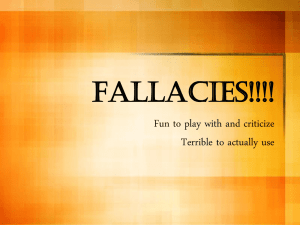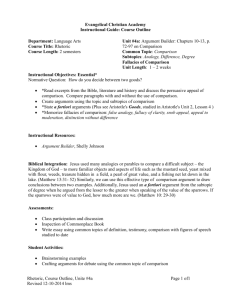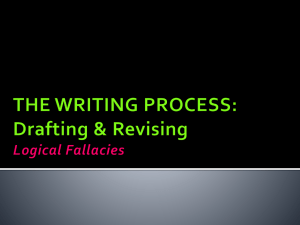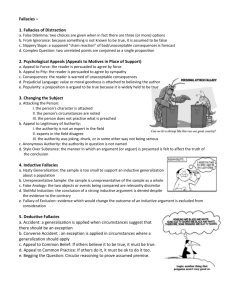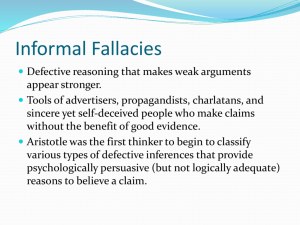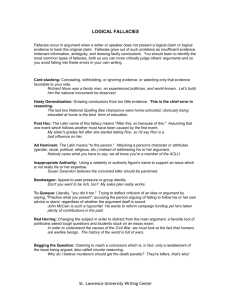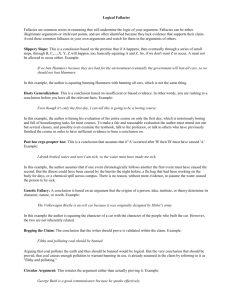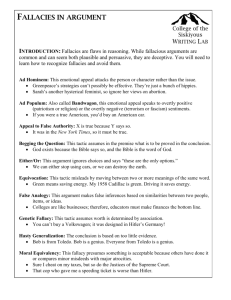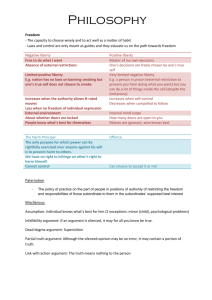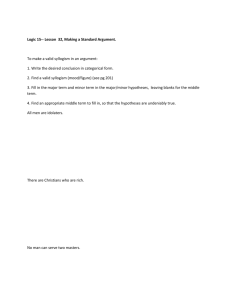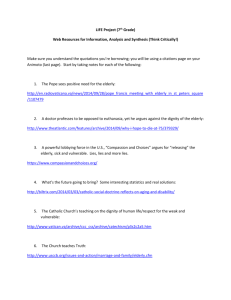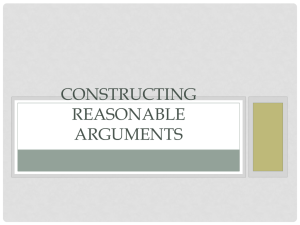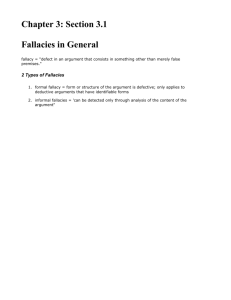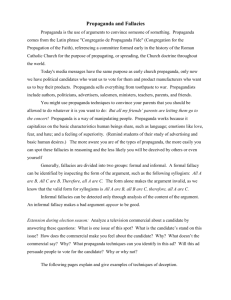Logical Fallacies
advertisement
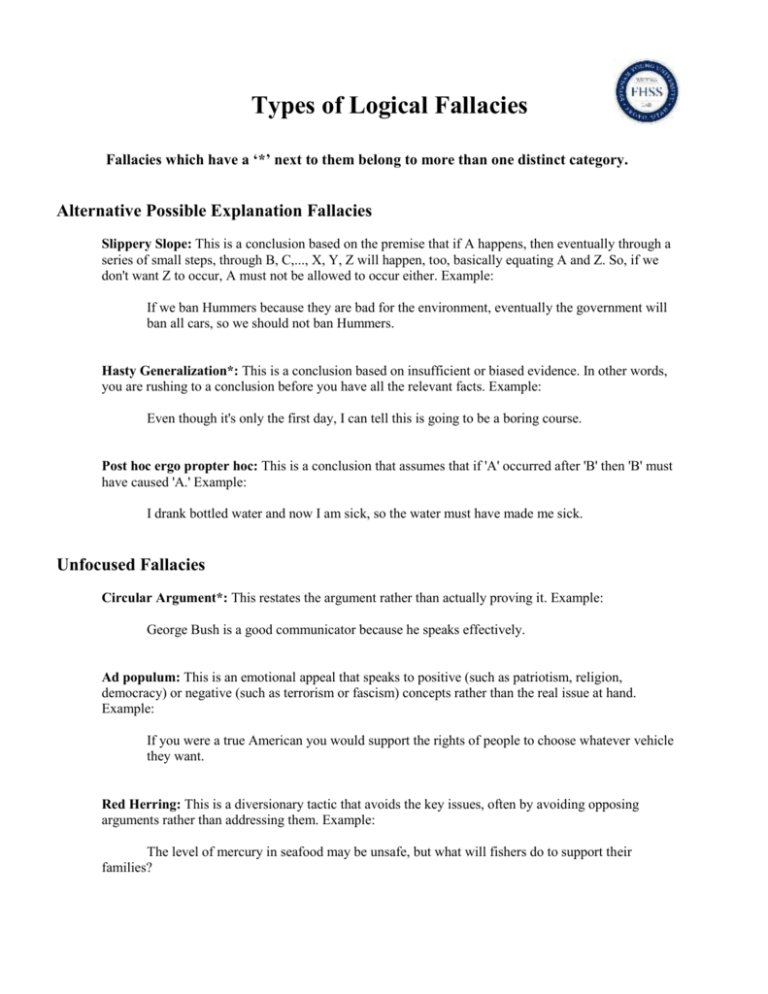
Types of Logical Fallacies Fallacies which have a ‘*’ next to them belong to more than one distinct category. Alternative Possible Explanation Fallacies Slippery Slope: This is a conclusion based on the premise that if A happens, then eventually through a series of small steps, through B, C,..., X, Y, Z will happen, too, basically equating A and Z. So, if we don't want Z to occur, A must not be allowed to occur either. Example: If we ban Hummers because they are bad for the environment, eventually the government will ban all cars, so we should not ban Hummers. Hasty Generalization*: This is a conclusion based on insufficient or biased evidence. In other words, you are rushing to a conclusion before you have all the relevant facts. Example: Even though it's only the first day, I can tell this is going to be a boring course. Post hoc ergo propter hoc: This is a conclusion that assumes that if 'A' occurred after 'B' then 'B' must have caused 'A.' Example: I drank bottled water and now I am sick, so the water must have made me sick. Unfocused Fallacies Circular Argument*: This restates the argument rather than actually proving it. Example: George Bush is a good communicator because he speaks effectively. Ad populum: This is an emotional appeal that speaks to positive (such as patriotism, religion, democracy) or negative (such as terrorism or fascism) concepts rather than the real issue at hand. Example: If you were a true American you would support the rights of people to choose whatever vehicle they want. Red Herring: This is a diversionary tactic that avoids the key issues, often by avoiding opposing arguments rather than addressing them. Example: The level of mercury in seafood may be unsafe, but what will fishers do to support their families? Appeal to pity: The appeal to pity takes place when an arguer tries to get people to accept a conclusion by making them feel sorry for someone. Example: I know the exam is graded based on performance, but you should give me an A. My cat has been sick, my car broke down, and I've had a cold, so it was really hard for me to study! Weak analogy: Comparing two things that aren't really alike in the relevant respects. Example: Guns are like hammers—they're both tools with metal parts that could be used to kill someone. And yet it would be ridiculous to restrict the purchase of hammers—so restrictions on purchasing guns are equally ridiculous. Missing the point: The premises of an argument do support a particular conclusion—but not the conclusion that the arguer actually draws. Example: The seriousness of a punishment should match the seriousness of the crime. Right now, the punishment for drunk driving may simply be a fine. But drunk driving is a very serious crime that can kill innocent people. So the death penalty should be the punishment for drunk driving." Lack of Evidence Fallacies Hasty Generalization*: This is a conclusion based on insufficient or biased evidence. In other words, you are rushing to a conclusion before you have all the relevant facts. Example: Even though it's only the first day, I can tell this is going to be a boring course. Circular Argument*: This restates the argument rather than actually proving it. Example: George Bush is a good communicator because he speaks effectively. Either/or: This is a conclusion that oversimplifies the argument by reducing it to only two sides or choices. Example: We can either stop using cars or destroy the earth. Straw Man*: This move oversimplifies an opponent's viewpoint and then attacks that hollow argument. Example: People who don't support the proposed state minimum wage increase hate the poor. Appeal to ignorance/ Negative Evidence: Appeal to a point of view because of a lack of evidence. Example: People have been trying for centuries to prove that God exists. But no one has yet been able to prove it. Therefore, God does not exist. Definition and Origin Fallacies Straw Man*: This move oversimplifies an opponent's viewpoint and then attacks that hollow argument. Example: People who don't support the proposed state minimum wage increase hate the poor. Moral Equivalence: This fallacy compares minor misdeeds with major atrocities. Example: That parking attendant who gave me a ticket is as bad as Hitler. Equivocation: Equivocation is sliding between two or more different meanings of a single word or phrase that is important to the argument. Example: Giving money to charity is the right thing to do. So charities have a right to our money. Appeal to authority: Using an authority that has no expertise on the matter at hand to give clout to an argument. Example: We should abolish the death penalty. Many respected people, such as actor Guy Handsome, have publicly stated their opposition to it. Genetic Fallacy: A conclusion is based on an argument that the origins of a person, idea, institute, or theory determine its character, nature, or worth. Example: The Volkswagen Beetle is an evil car because it was originally designed by Hitler's army. Begging the Claim: The conclusion that the writer should prove is validated within the claim. Example: Filthy and polluting coal should be banned. Ad hominem: This is an attack on the character of a person rather than her/his opinions or arguments. Example: Green Peace's strategies aren't effective because they are all dirty, lazy hippies. Visit http://fhsswriting.byu.edu/ for style guides, handouts, and help with writing, research, and more.
